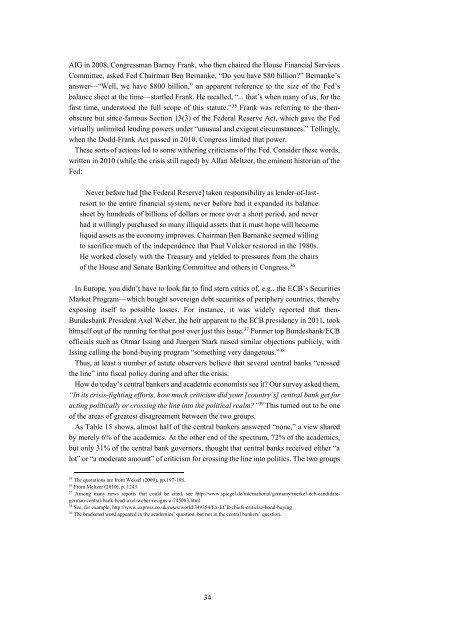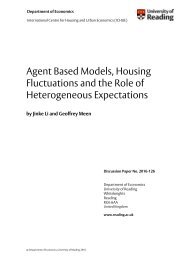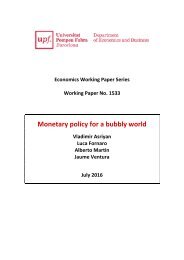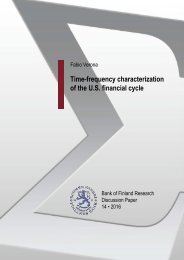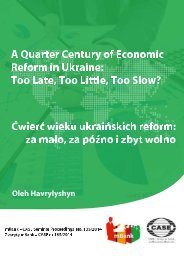Necessity as the mother of invention monetary policy after the crisis
n?u=RePEc:dnb:dnbwpp:525&r=mac
n?u=RePEc:dnb:dnbwpp:525&r=mac
Create successful ePaper yourself
Turn your PDF publications into a flip-book with our unique Google optimized e-Paper software.
AIG in 2008, Congressman Barney Frank, who <strong>the</strong>n chaired <strong>the</strong> House Financial Services<br />
Committee, <strong>as</strong>ked Fed Chairman Ben Bernanke, “Do you have $80 billion?” Bernanke’s<br />
answer—“Well, we have $800 billion,” an apparent reference to <strong>the</strong> size <strong>of</strong> <strong>the</strong> Fed’s<br />
balance sheet at <strong>the</strong> time—startled Frank. He recalled, “... that’s when many <strong>of</strong> us, for <strong>the</strong><br />
first time, understood <strong>the</strong> full scope <strong>of</strong> this statute.” 35 Frank w<strong>as</strong> referring to <strong>the</strong> <strong>the</strong>nobscure<br />
but since-famous Section 13(3) <strong>of</strong> <strong>the</strong> Federal Reserve Act, which gave <strong>the</strong> Fed<br />
virtually unlimited lending powers under “unusual and exigent circumstances.” Tellingly,<br />
when <strong>the</strong> Dodd-Frank Act p<strong>as</strong>sed in 2010, Congress limited that power.<br />
These sorts <strong>of</strong> actions led to some wi<strong>the</strong>ring criticisms <strong>of</strong> <strong>the</strong> Fed. Consider <strong>the</strong>se words,<br />
written in 2010 (while <strong>the</strong> <strong>crisis</strong> still raged) by Allan Meltzer, <strong>the</strong> eminent historian <strong>of</strong> <strong>the</strong><br />
Fed:<br />
Never before had [<strong>the</strong> Federal Reserve] taken responsibility <strong>as</strong> lender-<strong>of</strong>-l<strong>as</strong>tresort<br />
to <strong>the</strong> entire financial system, never before had it expanded its balance<br />
sheet by hundreds <strong>of</strong> billions <strong>of</strong> dollars or more over a short period, and never<br />
had it willingly purch<strong>as</strong>ed so many illiquid <strong>as</strong>sets that it must hope will become<br />
liquid <strong>as</strong>sets <strong>as</strong> <strong>the</strong> economy improves. Chairman Ben Bernanke seemed willing<br />
to sacrifice much <strong>of</strong> <strong>the</strong> independence that Paul Volcker restored in <strong>the</strong> 1980s.<br />
He worked closely with <strong>the</strong> Tre<strong>as</strong>ury and yielded to pressures from <strong>the</strong> chairs<br />
<strong>of</strong> <strong>the</strong> House and Senate Banking Committee and o<strong>the</strong>rs in Congress. 36<br />
In Europe, you didn’t have to look far to find stern critics <strong>of</strong>, e.g., <strong>the</strong> ECB’s Securities<br />
Market Program—which bought sovereign debt securities <strong>of</strong> periphery countries, <strong>the</strong>reby<br />
exposing itself to possible losses. For instance, it w<strong>as</strong> widely reported that <strong>the</strong>n-<br />
Bundesbank President Axel Weber, <strong>the</strong> heir apparent to <strong>the</strong> ECB presidency in 2011, took<br />
himself out <strong>of</strong> <strong>the</strong> running for that post over just this issue. 37 Former top Bundesbank/ECB<br />
<strong>of</strong>ficials such <strong>as</strong> Otmar Issing and Juergen Stark raised similar objections publicly, with<br />
Issing calling <strong>the</strong> bond-buying program “something very dangerous.” 38<br />
Thus, at le<strong>as</strong>t a number <strong>of</strong> <strong>as</strong>tute observers believe that several central banks “crossed<br />
<strong>the</strong> line” into fiscal <strong>policy</strong> during and <strong>after</strong> <strong>the</strong> <strong>crisis</strong>.<br />
How do today’s central bankers and academic economists see it? Our survey <strong>as</strong>ked <strong>the</strong>m,<br />
“In its <strong>crisis</strong>-fighting efforts, how much criticism did your [country’s] central bank get for<br />
acting politically or crossing <strong>the</strong> line into <strong>the</strong> political realm?” 39 This turned out to be one<br />
<strong>of</strong> <strong>the</strong> are<strong>as</strong> <strong>of</strong> greatest disagreement between <strong>the</strong> two groups.<br />
As Table 15 shows, almost half <strong>of</strong> <strong>the</strong> central bankers answered “none,” a view shared<br />
by merely 6% <strong>of</strong> <strong>the</strong> academics. At <strong>the</strong> o<strong>the</strong>r end <strong>of</strong> <strong>the</strong> spectrum, 72% <strong>of</strong> <strong>the</strong> academics,<br />
but only 31% <strong>of</strong> <strong>the</strong> central bank governors, thought that central banks received ei<strong>the</strong>r “a<br />
lot” or “a moderate amount” <strong>of</strong> criticism for crossing <strong>the</strong> line into politics. The two groups<br />
35<br />
The quotations are from Wessel (2009), pp.197-198.<br />
36<br />
From Meltzer (2010), p. 1243.<br />
37<br />
Among many news reports that could be cited, see http://www.spiegel.de/international/germany/merkel-ecb-candidategerman-central-bank-head-axel-weber-resigns-a-745083.html<br />
38<br />
See, for example, http://www.express.co.uk/news/world/349354/Ex-ECB-chiefs-criticise-bond-buying<br />
39<br />
The bracketed word appeared in <strong>the</strong> academics’ question, but not in <strong>the</strong> central bankers’ question.<br />
34


